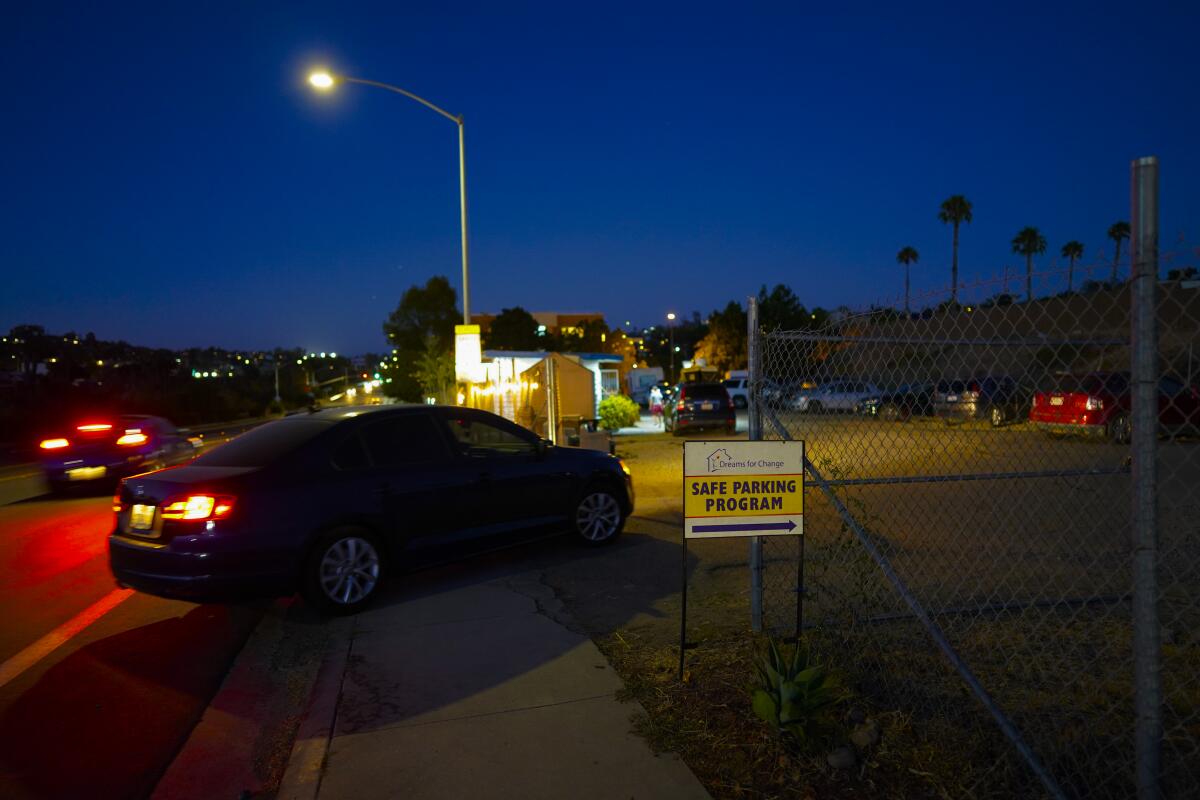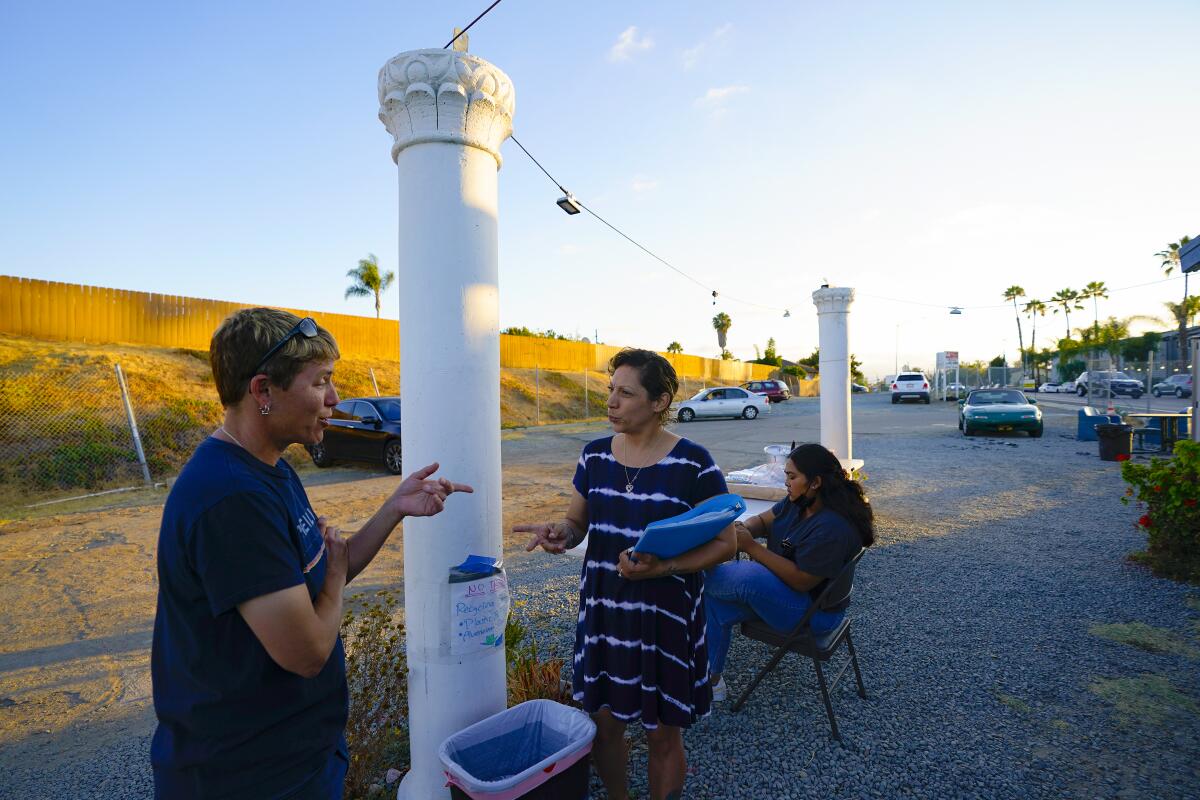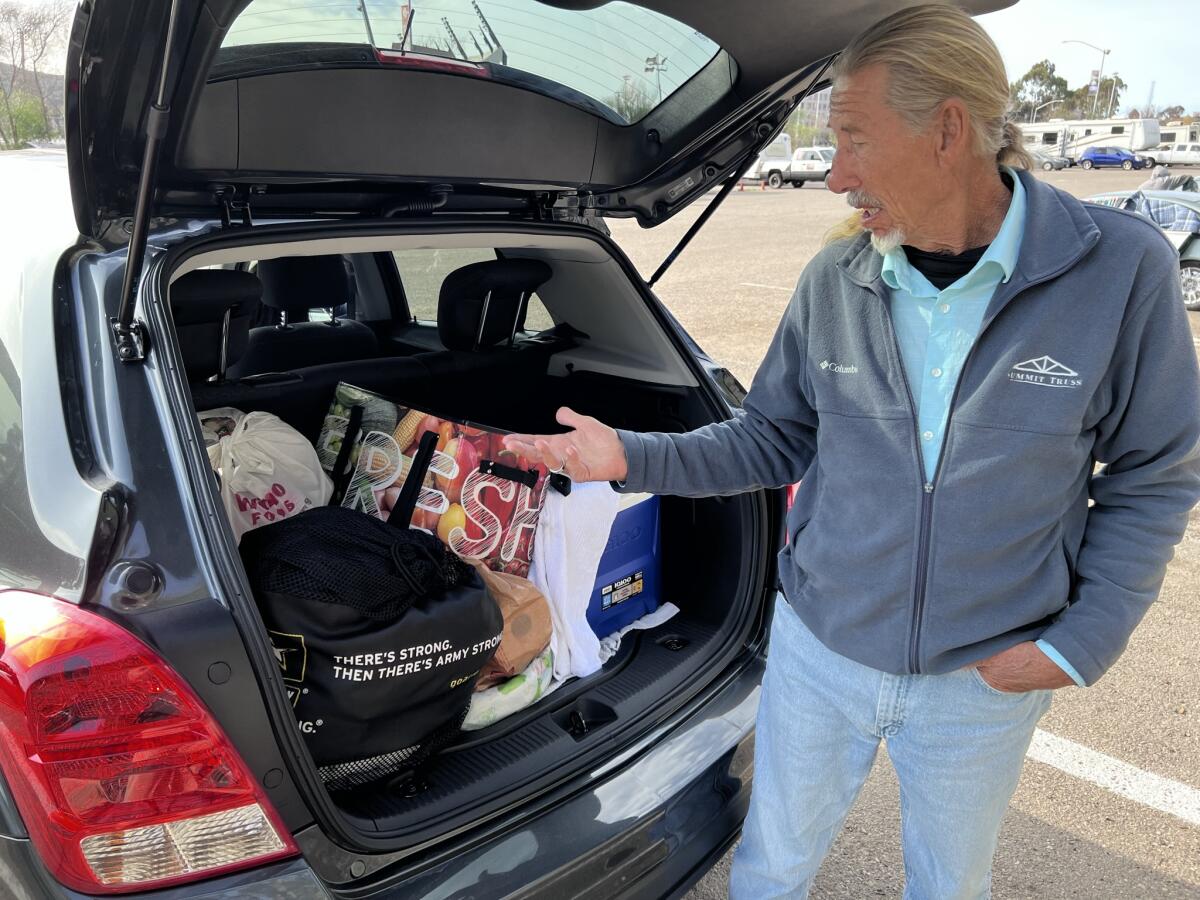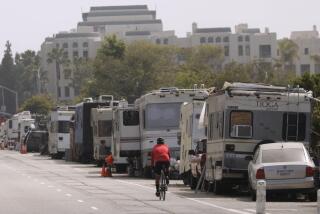Only one safe parking lot for homeless people in San Diego accepts RVs

Operator of Encanto lot said there were just too many challenges. A larger nonprofit is hoping to have better luck.
SAN DIEGO — While cities throughout San Diego County expand services and shelters for homeless people, the county is down to just one safe parking lot that accepts recreational vehicles.
Dreams for Change’s safe parking lot on Imperial in the San Diego neighborhood of Encanto stopped accepting oversized vehicles in the summer because of several problems, said Teresa Smith, the nonprofit’s chief executive.
“There was tension between RVs and cars,” Smith said, adding that sometimes the confrontations were sparked simply because people sleeping in cramped cars resented the better conditions in RVs.
Two RVs caught fire, and the owner of one left the charred vehicle behind for Dreams for Change to tow away. Another RV owner walked away and never returned, again leaving the nonprofit to pay to have the vehicle towed.
Smith said some RV owners are resistant to finding permanent housing, and instead are content to stay forever, and for free, in a safe parking lot. Since the decision against RVs, most have left, with only one person remaning who lives in a trailer.
“I’ve heard most of the RV safe parking lots do struggle because they become in essence an RV park,” she said. .
“I haven’t heard of any that have been an all-around success,” she said. “It’s been hit and miss from what I hear in the safe parking community as far as RVs are concerned.”
The only other safe parking lot in the county that accepts oversized vehicles is operated by Jewish Family Service in Mission Valley. Chris Olsen, chief of staff with the nonprofit, said he has not seen any of the problems that Smith encountered.
The lot, in fact, began accommodating more RVs since it converted to a 24-hour operation in September, he said.
San Diego launched safe parking for homeless people living in RVs because of problems they cause on city streets. San Diego’s oversized vehicle ordinance prohibits RVs from parking on public streets overnight, and violators sometimes have returned to their vehicles to find they had been towed. Some owners never retrieve them, losing both a vehicle and a home.
A safe parking lot operated by Jewish Family Service opened in 2019 near the entrance of what then was Qualcomm Stadium. Within weeks of its opening in June of that year, something was noticeably off. Only three RVs were using the lot.
Smith said at the time that she wasn’t surprised RV owners were staying away because the Jewish Family Service lot required people to drive off by 7 a.m., which was too much of a daily burden. Robert Ewing, a disabled homeless veteran who attended the opening of the lot that June, also had predicted the curfew would keep away RV owners who could not afford to drive their gas-guzzling vehicles back and forth.
Three years later, the San Diego City Council agreed to fund 24-hour service at the parking lot after the release of a study by UC San Diego’s Department of Urban Studies and Planning. Among the findings in the two-year study was that RV owners strongly wanted a parking lot where they could stay around the clock.
On a July day this year when police ticketed and towed away RVs parked on a street near Mission Bay, many of the vehicle owners said they would go into a safe parking lot, if only one allowed them to stay 24 hours.
The Mission Valley safe parking lot began allowing RVs to stay 24 hours in September, and Olsen said the number of RVs at the lot has increased to about 20.
The two lots have different rules. The Jewish Family Service lot allows people and their vehicles to stay on the lot with their vehicles all day, while Dreams for Change require owners of RVs and trailers to leave while their vehicles are allowed to stay behind.
Smith said the rule was to encourage the RV and trailer owners to get out and search for jobs, housing or services, and to discourage them from getting too comfortable in the parking lot.
“Some people want to just hang out all day,” she said.
Smith said her small nonprofit does not have the same resources as the much larger Jewish Family Service, which may put the latter group in a position to handle situations she encountered.
At the Dreams for Change lot, Roxana Zelaya is the last client living in a trailer. Smith said she is trying to work with Zelaya on moving ahead, but is not planning to evict her.
“They need to work with me and find a program that’s going to be able to help me,” Zelaya said. “I’m stressed when they’re telling me I have to exit, and I’m doing my best.”
Zelaya has a car and a trailer that’s attached to a truck, which is presenting a problem. She said she’s willing to go to the Jewish Family Service lot and would use her car to get to work when she finds a job, but the group requires people to take their vehicles with them when they leave, which she couldn’t easily do because she has three.

Olsen indicated there could be some middle ground to meet Zelaya’s needs.
“As someone is working toward their housing goals, the staff will work with them if special arrangements are needed,” he wrote in an email that also included a phone number for Zelaya to call for assistance.
Olsen and Smith said the majority of their clients are experiencing homelessness for the first time, about a quarter are older than 60, and many have full-time jobs. Smith said about 35% of her clients successfully exit from homelessness and Olsen said about 30% successfully exit, but that could change because the data collection is new.
On a recent morning at the Jewish Family Service lot in Mission Valley, many of the spots were empty because people were gone for the day. People in RVs hung out in or around their vehicles, as did people who live in their cars.

Robert Prokosh, 68, has lived in a vehicle on the lot since July 1, the day he left Las Vegas after his monthly rent doubled. It’s his first time experiencing homelessness, and he said he moved to San Diego, his home town, because he had heard about the safe parking lot.
“You can live here in your car better than you can in Vegas, where it’s 120 degrees,” he said.
Olsen said staff members at the lot will work with Prokosh to find long-term help and housing. When asked where he hopes to be in a year, Prokosh didn’t have an immediate answer.
“Hopefully out of here,” he said.
More to Read
Sign up for Essential California
The most important California stories and recommendations in your inbox every morning.
You may occasionally receive promotional content from the Los Angeles Times.











